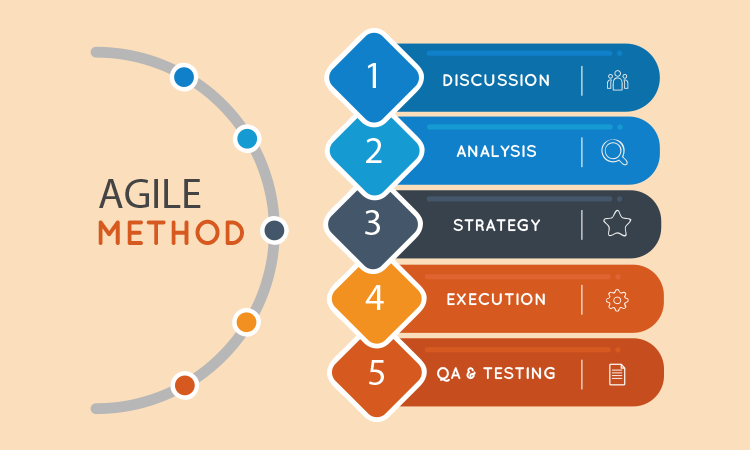Agile project management has grown in popularity in recent years as a flexible approach that promotes effective collaboration, responsiveness to changes, and frequent value delivery. Being established as a method for more effective software development, it has evolved into a mindset and now is also used in project management and by business organizations that strive to become more flexible, responsive to changes and uncertainty, and to deliver value that perfectly meets customers’ needs. Read the article to learn more about this methodology, its benefits, and guiding principles.
What is Agile methodology, and what are its benefits?

Agile is a methodology for developing software and managing projects, which is focused on frequent value delivery under conditions of change and uncertainty. It was established in 2001 in response to organizations’ need for a more flexible and adaptable software development framework. Agile is an incremental approach – it involves frequent delivery of smaller pieces of work based on customers’ requirements and feedback. The latter makes it also a user-centric methodology, as it’s intended to deliver a product or services that meet customers’ needs to the full.
Traditional project management methodology, Waterfall, is rather deterministic. You plan the whole project at the beginning and shouldn’t deviate from the initial plan too much. Frequent changes will bring chaos to the workflow, which can even derail a project. In contrast, Agile gives room for transformations and makes the work on a project more flexible and adaptable to them.
Whatever project management methodology you choose, you can improve project workflow and outcomes with project or resource management software. For example, Epicflow, multi-project resource management software epicflow.com is a flexible solution that ensures smart project, task, and resource management; with its functionality, you can make changes without running the workflow and deliver every project on time and within budget.
What are the benefits of implementing Agile?

1. Keeping focus on users and achieving business value.
Each successive iteration is based on users’ feedback and needs, which in turn contributes to increasing their satisfaction with the deliverable.
2. Flexibility and adaptability.
It’s no secret that the present-day business environment is uncertain and frequently changing, so companies should adapt their processes (and project management is no exception) to changing market conditions and customers’ requirements and needs. And this is where Agile framework’s flexibility and adaptability comes into action.
3. Frequent and early delivery.
Agile approach to value delivery is based on iterations that make it possible to achieve tangible results frequently.
4. Higher quality of the final deliverable.
Agile framework requires constant reviews and testing and is focused on continuous improvements, which makes it possible to increase the quality of the final deliverable.
All the above-mentioned benefits become achievable thanks to Agile principles. Let’s examine them in the next section.
What are the principles behind Agile methodology?

The following guiding principles of Agile methodology are used both in software development and project management.
1. Customer satisfaction.
In the Agile framework, customer satisfaction is the highest priority, which is achieved thanks to regular value delivery.
2. Welcoming change.
In contrast to the traditional project management, where changes are treated with great concern, in Agile methodology, changing requirements are acceptable at any stage of a project lifecycle (or product development). Change is regarded as a driving force for customers’ competitive advantage and their satisfaction with the deliverable.
3. Frequent value delivery.
This principle aims to shorten the time between planning and value delivery as well as to reduce the amount of documentation prepared before the work on a product starts. The optimum interval is from several weeks to several months; a shorter timeline is more preferable.
4. Close cooperation with business people.
This principle recommends daily cooperation of business people with software developers (or any other people who are working on value creation). This increases the efficiency of work, makes it possible to address any arising issues timely, as well as keeps the management engaged.
5. Build a team of motivated employees, provide them with support and trust.
This means that you should empower your team members to make decisions and do the assigned work without micromanaging them. It will increase their engagement and positively affect the results of their work.
6. Give priority to face-to-face communication.

This recommendation has become especially relevant for the present-day hybrid and remote work environment. The main idea of it is to ensure clarity, avoid misunderstandings, ambiguity, and waiting for responses, and in such a way make the work on a project/product more efficient. Fortunately, you can maintain virtual face-to-face communication with a variety of tools.
7. Progress is indicated by working software.
It’s the result of a team’s work that matters most – the deliverable should function properly and meet the customers’ expectations. The work progresses if the team manages to achieve tangible results.
8. Promoting sustainable development.
This principle recommends to keep a constant pace of value delivery – the team members working on a project should be productive but at the same they shouldn’t be overburdened with the amount of work to be completed.
9. Technical excellence.
According to this principle, the deliverables should be of the highest quality in terms of technical characteristics and design.
10. Simplicity is essential.
This principle recommends avoiding doing unnecessary actions. If something can be done in a simple way and with less effort, don’t make it complicated. This makes it possible to save team members’ effort and time they can spend on things that really matter for the project result.
11. Self-organizing teams deliver the best results.

This principle emphasizes the role of self-organizing teams that are fully responsible for assigning work, tracking progress, and are empowered to make decisions on their own. Self-organizing teams of motivated employees are an essential prerequisite for fruitful work on a project.
12. Analyzing performance and finding ways to improve efficiency.
Finally, it’s highly recommended that Agile teams review their own performance on a regular basis, analyze inefficiencies, and adjust their work accordingly. Such a practice will help the team members increase their efficiency.
To sum up, the principles behind Agile methodology are centered around the following things:
- Ensuring customers’ satisfaction by perfectly meeting their needs and frequent value delivery;
- Empowering team members to make decisions on their own and complete their work without constant supervision;
- Promoting fruitful collaboration among the team members, company’s management, and customers;
- Flexibility, simplifying processes, and increasing their efficiency;
- Ensuring high quality of the final deliverable.
These principles have not only become the basis for a game-changing approach to software development and project management, but have also evolved into the Agile mindset. It helps organizations (or teams) become more adaptable to changes and uncertainty as well as ensure more fruitful interaction among employees, which is focused on continuous improvement and encouraging innovations.
Conclusion
Agile project management is a flexible and adaptable approach that enables you to run projects more efficiently. By structuring projects around motivated individuals, embracing change, delivering working software frequently, and collaborating with clients and stakeholders, you can ensure your projects are completed on time and to a high standard.
Related Posts:
- An Overview of the Hubble Space Telescope
- 10 Reasons to Choose a WYSIWYG Editor for Your Next Project
- VinDiesel & James Cameron Working on Secret Project…
- Project Free TV: Top 5 Action TV Shows to Watch…
- PARTICLE PHOTON: Build (A) Perfect Connected IOT Project
- 8 Main Factors to Consider While Hiring Payroll…







